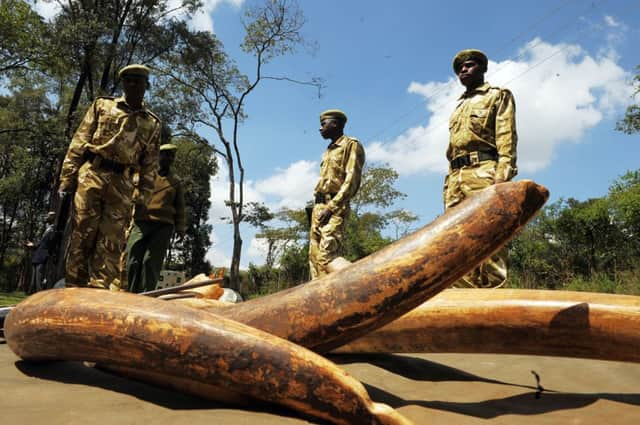Add poachers to endangered list


IN A previous appearance on these pages, we referred to our pioneering scientific research in DNA profiling of animals in the context of ensuring genetic diversity, both within zoos and in in-situ conservation. It’s an expertise that the Royal Zoological Society of Scotland brought into its fold a few years ago when it invited TRACE Wildlife Forensics Network (WFN), an established non-governmental organisation utilising scientific techniques for illegal wildlife trade detection, to base itself at Edinburgh Zoo.
International wildlife crime is reputed to be worth around $10 billion (£600 million) annually. It involves criminal gangs, former soldiers, even corrupt vets and pilots. It uses the latest technology to identify, target and slaughter some of our rarest animals such as rhinos, elephants and tigers in pursuit of their horns, tusks and skin.
Advertisement
Hide AdAdvertisement
Hide AdGramme for gramme, rhino horn is now worth more than gold or cocaine, a single horn changing hands for around $250,000 (£149,751). It is being used in traditional medicine in much of south- east Asia in the belief that it can reduce a fever, stem nose bleeds or more recently, even provide a cure for cancer. Tests suggest there is no evidence to support these views and the horn provides no significant medicinal value.
It’s now recognised as a growing industry though and a massive threat to many of our planet’s species. WWF reports that in 2007, 13 rhinos were killed in South Africa. In 2013, the number was 1,004, averaging three rhinos a day. It states there are estimated to be around 3,200 tigers left in the world and yet between 2000 and 2012, 1,425 were poached.
As a conservation charity, we may not be WWF, but as a centre of excellence in genetic profiling, we have been playing an important role in helping tackle this most pressing of issues. In 2007, ASEAN-WEN (the Association of South-East Asian Nations Wildlife Enforcement Network) comprising police, customs officials, scientists and environmental agencies, produced a plan of action which stipulated that each country in this network must have the ability to forensically identify traded animals and plants, as one of a number of steps in building up evidence of these crimes to bring about successful prosecutions.
Establishing skills on a local basis was paramount as sending forensic casework to labs such as ours overseas was neither desirable nor practical. Since 2009, thanks to core funding from the UK Darwin initiative and RZSS, TRACE alongside TRAFFIC (the wildlife trade monitoring programme of the WWF) has been helping build expertise and advise on the setting up of labs and facilities.
Through overseas workshops and study visits to the UK, scientists in countries such as Malaysia, Thailand and Vietnam have now been trained in the collection of samples, DNA recovery, genetic analysis, DNA sequencing, database comparison and sampling identification so they can identify what a species is, where it came from geographically, which individual it came from and whether it has been captive bred. We are delighted to say that in a short space of time, labs now exist in Thailand and Malaysia. Enforcement officers, who are often the first to be alerted to traded animals, have also been trained in the collection, storing and transferring of forensic evidence and investigators have also been given training in profiling too.The question is – is what we are doing making a difference? Well, small successes are being seen but it requires concerted and cohesive effort. Locals need to be educated on the law and exposed to the truth when it comes to traditionally based medicines, tourists need to be alert to the legalities concerning wildlife souvenirs and continued enforcement of the law is required with tough sentences placed on those who break it and good environmental programmes for all.
As to the future, we are keen to help develop a DNA database for captive flagship species such as tigers and elephants, this way ensuring they do not end up laundered into the illegal trade. We also wish to address the issue of wildlife laundering through captive breeding facilities
Last week, David Cameron, Prince William and Prince Charles hosted an international summit on the illegal wildlife trade in London. More than 50 leading politicians from around the world were in attendance. Two scientists from The Royal Zoological Society of Scotland were invited to demonstrate the effectiveness of wildlife forensics and hopefully the summit will have an appreciable effect on this trade.
• Chris West is CEO of the Royal Zoological Society of Scotland www.rzss.org.uk
SEE ALSO